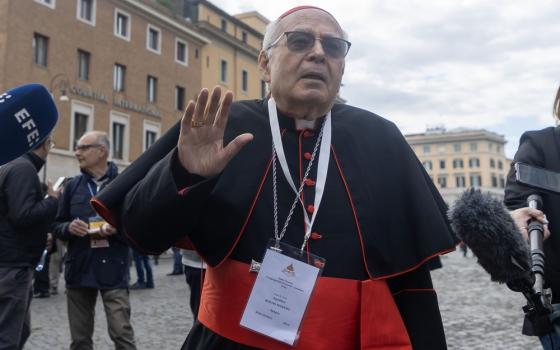The document from the International Theological Commission, " 'Sensus Fidei' in the Life of the Church," takes a long overdue look at what this sense of the faith is for the individual and for the larger church. Some of the insights of the nine theologian writers are most encouraging for progressive Catholics; others, not so much. The document was submitted to Cardinal Gerhard Müller, prefect of the Congregation for the Doctrine of the Faith, who authorized its publication.
At one point, the writers consider the most important dispositions a Catholic needs for authentic participations in the sensus fidei (sense of the faith). "No single one can be discussed in an isolated manner; its relationship to each and all of the others has to be taken into account," they write.
"The first and most fundamental is ... active participation in the liturgy, especially the Eucharist, regular reception of the sacrament of reconciliation, discernment and exercise of gifts and charisms received from the Holy Spirit ... There are countless ways in which such participation may occur, but what is common in all cases is an active solidarity with the Church."
Now, this sounds pretty rigid. If taken literally, it could eliminate from authentic participation in the sense of the faith that overwhelming mass of Catholics who receive reconciliation irregularly. But I hope that is not the intent of the writers, and I do not think the writers intend to cut off those who attend Mass on a less-than-weekly basis. Might Catholics who belong to intentional eucharistic communities or small faith groups qualify as actively participating in the Eucharist? I think so, especially if they cannot tolerate abysmal liturgy, awful preaching or closed attitudes at the Catholic parish or parishes available to them. As the document notes, what is most needed is "an active solidarity with the Church" -- that is, with the whole church.
The second disposition is "a profound and attentive listening to the word of God" coming from Scripture and tradition. "It is not at all required that all members of the people of God should study the Bible and the witnesses of Tradition in a scientific way." It's the listening and "a heartfelt response" that counts.
Third is an openness to reason. "Because there is only one God, there is only one truth, recognised from different points of view and in different ways by faith and by reason, respectively. Faith purifies reason and widens its scope, and reason purifies faith and clarifies its coherence."
The fourth disposition a faithful Catholic needs is "attentiveness to the magisterium of the Church, and a willingness to listen to the teaching of the pastors of the Church, as an act of freedom." The document does not say immediate obedience is required, though the "magisterium is rooted in the mission of Jesus." Earlier in the document, the writers state that the sense of faith "enables individual believers to perceive any disharmony, incoherence, or contradiction between a teaching or practice and the authentic Christian faith ... Alerted by their sensus fidei, individual believers may deny assent even to the teaching of legitimate pastors if they do not recognise in that teaching the voice of Christ." The term "legitimate pastors" obviously includes priests, bishops and popes.
Fifth is holiness. It is "the vocation of the whole Church and of every believer. To be holy fundamentally means to belong to God in Jesus Christ and in his Church, to be baptised and to live the faith in the power of the Holy Spirit. ... Because [holiness] fundamentally requires an imitatio Christi, holiness essentially involves humility. Such humility is the very opposite of uncertainty or timidity; it is an act of spiritual freedom. ... A true indicator of holiness is 'peace and joy in the Holy Spirit.' ... Joy is the opposite of the bitterness and wrath that grieve the Holy Spirit."
A final sign that one has the sensus fidei is the willingness to contribute "to the edification of the Church as one body" and the avoidance of what "foster[s] division and particularism within her. ... [This] means building up the Church both in the inner consciousness of its faith and in terms of [adding] new members."
While all these signs have their place, I think it's unfortunate that the theologians who wrote this document did not explicitly state that a concern for justice in the world and church and a generous giving of self to the poor and needy today are pre-eminent signs that one is in touch with the sensus fidei.
In so many places, " 'Sensus Fidei' in the Life of the Church" elaborates on the rights of believing Catholics as well as their responsibilities. In one powerful passage, the document says, "In matters of faith the baptised cannot be passive ... so the magisterium has to be attentive to the sensus fidelium, the living voice of the people of God. Not only do they have the right to be heard, but their reaction to what is proposed as belonging to the faith of the Apostles must be taken very seriously, because it is by the Church as a whole that the apostolic faith is borne in the power of the Spirit. The magisterium does not have sole responsibility for it."
Yet three paragraphs later, the writers declare: "The magisterium also judges with authority whether opinions which are present among the people of God and which may seem to be the sensus fidelium, actually correspond to the truth of the Tradition received from the Apostles. ... Thus, judgement regarding the authenticity of the sensus fidelium belongs ultimately not to the faithful themselves nor to theology but to the magisterium."
There is a mile-wide contradiction here. It's as if one or more members of the commission said they could not sign the document without a clear declaration that when all is said and done, the magisterium alone has a monopoly on discerning what is authentic doctrine. I do not know how unqualified outbursts of clerical domination of this kind can be minimized or eliminated, but I believe they should be. I do know that in this document, several assertions of magisterial superiority serve to denigrate what is an otherwise engaging presentation of an important but often omitted or underplayed aspect of Catholicism.






